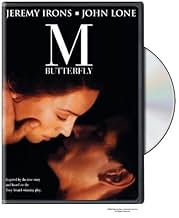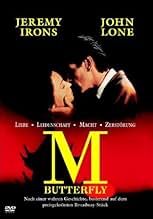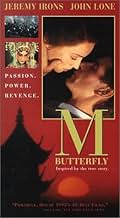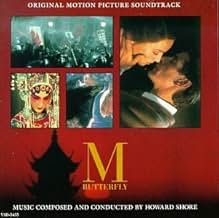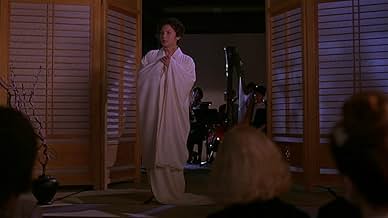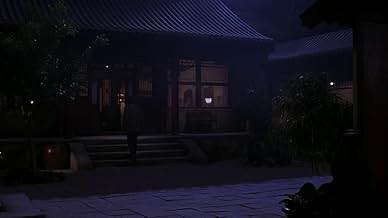NOTE IMDb
6,7/10
11 k
MA NOTE
En Chine, dans les années 60, le diplomate français René Gallimard tombe amoureux d'une chanteuse d'opéra, Song Liling, mais Song n'est pas du tout ce qu'il pense.En Chine, dans les années 60, le diplomate français René Gallimard tombe amoureux d'une chanteuse d'opéra, Song Liling, mais Song n'est pas du tout ce qu'il pense.En Chine, dans les années 60, le diplomate français René Gallimard tombe amoureux d'une chanteuse d'opéra, Song Liling, mais Song n'est pas du tout ce qu'il pense.
- Récompenses
- 1 victoire et 1 nomination au total
Histoire
Le saviez-vous
- AnecdotesDavid Cronenberg loved the play so much that when he heard a movie was being made about it, he volunteered immediately to direct it.
- GaffesThe word accordion is misspelled "accordian" in the closing credits.
- Citations
Song Liling: The days I spent with you were the only days I ever truly existed.
Commentaire à la une
M. BUTTERFLY continues to rank among the more important cinematic adaptations of a brilliant play - this one by the playwright David Henry Hwang. Having the pleasure to see two productions of the play - New York and Los Angeles - and viewing the film (1993) in the theater and on DVD brings an immense amount of satisfaction of just how fine this work is and continues to satisfy. The fact that David Henry Hwang wrote the screenplay suggests how true to the original the film is and how much of an impact it makes on the viewer
M. BUTTERFLY is based on a true story that stunned the world. During the Cultural Revolution in China in the mid-1960s, a French diplomat René Gallimard (a brilliant portrayal by Jeremy Irons) falls in love with a Chinese opera singer Song Liling (John Lone) - women were never allowed to sing in the Beijing Opera so the fact that Song is a man is credible. Song Liling touches him with a love as vivid, as seductive--and as elusive--as a butterfly. The love affair is so fragile and respectful that René does not suspect that Song is a man in disguise. René Is an important diplomat with the French Embassy, married to Jeanne (Barbara Sukowa), and is responsible for maintaining the high standards of diplomacy. Song Liling has been placed in the position of an undercover agent to gather secrets from the Embassy about the American plans in Vietnam. As René is promoted he demands to see his M. Butterfly without her clothes, an Song's only protection about her gender identity is to reveal that she is pregnant with René's child and must leave to be with her family until the child is born. As the Cultural Revolution heightens the French Embassy is to be diminished and it is discovered that René has been in a liaison with with a Chinese spy and is sent back to France to be imprisoned. When he is put on trial Song appears in Paris to be placed on the witness stand and since years have passed since their last meeting, Song attempts to offer herself once again to be René's Butterfly. Whether or not René's passion was a flight of fancy, it sparked the most vigorous emotions of his life. Only in real life could love become so unreal. And only in such a dramatic tour de force do we learn how a fantasy can become a man's mistress--as well as his jailer. In a desperately touching final scene we see the imprisoned René perform the final act from the opera that has accompanied this film - Puccini's MADAMA BUTTERFLY.
The story is at once compelling, explosive and slyly humorous, 'a work of unrivaled brilliance, illuminating the conflict between men and women, the differences between East and West, racial stereotypes--and the shadows we cast around our most cherished illusions.' The musical score by Howard Shore integrates arias and choruses from Puccini's opera with music from Chinese opera and his own sensuously beautiful original musical score. David Cronenberg directs with the tight amount of surreal disbelief the piece needs, but it is the brilliant acting of Jeremy Irons and John Lone that illuminate this film. It is a masterwork.
Grady Harp
M. BUTTERFLY is based on a true story that stunned the world. During the Cultural Revolution in China in the mid-1960s, a French diplomat René Gallimard (a brilliant portrayal by Jeremy Irons) falls in love with a Chinese opera singer Song Liling (John Lone) - women were never allowed to sing in the Beijing Opera so the fact that Song is a man is credible. Song Liling touches him with a love as vivid, as seductive--and as elusive--as a butterfly. The love affair is so fragile and respectful that René does not suspect that Song is a man in disguise. René Is an important diplomat with the French Embassy, married to Jeanne (Barbara Sukowa), and is responsible for maintaining the high standards of diplomacy. Song Liling has been placed in the position of an undercover agent to gather secrets from the Embassy about the American plans in Vietnam. As René is promoted he demands to see his M. Butterfly without her clothes, an Song's only protection about her gender identity is to reveal that she is pregnant with René's child and must leave to be with her family until the child is born. As the Cultural Revolution heightens the French Embassy is to be diminished and it is discovered that René has been in a liaison with with a Chinese spy and is sent back to France to be imprisoned. When he is put on trial Song appears in Paris to be placed on the witness stand and since years have passed since their last meeting, Song attempts to offer herself once again to be René's Butterfly. Whether or not René's passion was a flight of fancy, it sparked the most vigorous emotions of his life. Only in real life could love become so unreal. And only in such a dramatic tour de force do we learn how a fantasy can become a man's mistress--as well as his jailer. In a desperately touching final scene we see the imprisoned René perform the final act from the opera that has accompanied this film - Puccini's MADAMA BUTTERFLY.
The story is at once compelling, explosive and slyly humorous, 'a work of unrivaled brilliance, illuminating the conflict between men and women, the differences between East and West, racial stereotypes--and the shadows we cast around our most cherished illusions.' The musical score by Howard Shore integrates arias and choruses from Puccini's opera with music from Chinese opera and his own sensuously beautiful original musical score. David Cronenberg directs with the tight amount of surreal disbelief the piece needs, but it is the brilliant acting of Jeremy Irons and John Lone that illuminate this film. It is a masterwork.
Grady Harp
Meilleurs choix
Connectez-vous pour évaluer et suivre la liste de favoris afin de recevoir des recommandations personnalisées
- How long is M. Butterfly?Alimenté par Alexa
Détails
Box-office
- Montant brut aux États-Unis et au Canada
- 1 498 795 $US
- Week-end de sortie aux États-Unis et au Canada
- 57 280 $US
- 3 oct. 1993
- Montant brut mondial
- 1 498 795 $US
- Durée1 heure 41 minutes
- Couleur
- Mixage
- Rapport de forme
- 1.85 : 1
Contribuer à cette page
Suggérer une modification ou ajouter du contenu manquant

Lacune principale
By what name was M. Butterfly (1993) officially released in India in English?
Répondre

